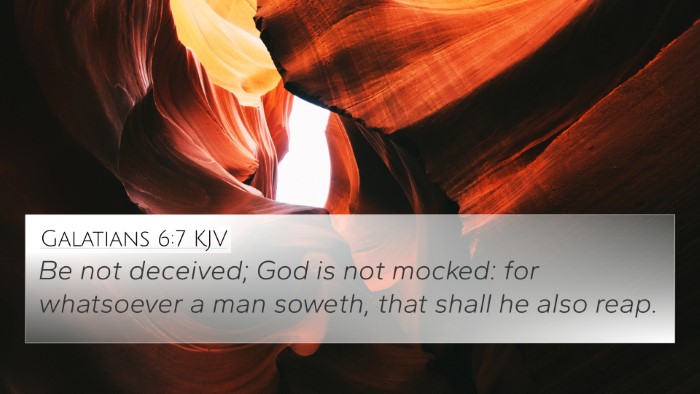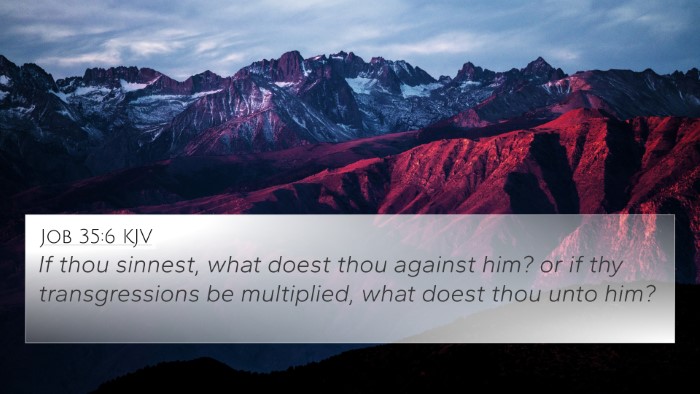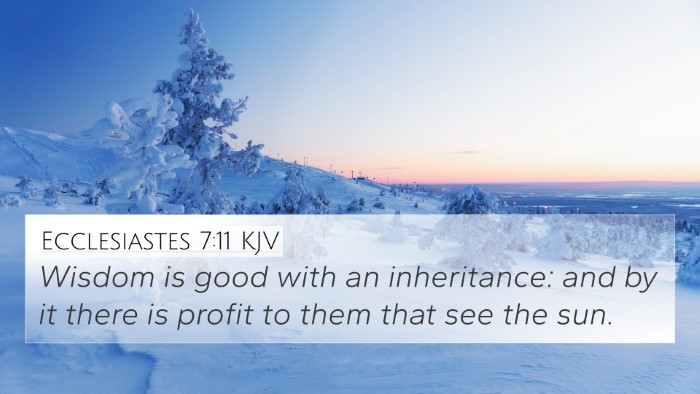Old Testament
Genesis Exodus Leviticus Numbers Deuteronomy Joshua Judges Ruth 1 Samuel 2 Samuel 1 Kings 2 Kings 1 Chronicles 2 Chronicles Ezra Nehemiah Esther Job Psalms Proverbs Ecclesiastes Song of Solomon Isaiah Jeremiah Lamentations Ezekiel Daniel Hosea Joel Amos Obadiah Jonah Micah Nahum Habakkuk Zephaniah Haggai Zechariah MalachiJob 22:2 Similar Verses
Job 22:2 Cross References
Can a man be profitable unto God, as he that is wise may be profitable unto himself?
Uncover the Rich Themes and Topics of This Bible Verse
Listed below are the Bible themes associated with Job 22:2. We invite you to explore each theme to gain deeper insights into the Scriptures.
Job 22:2 Cross Reference Verses
This section features a detailed cross-reference designed to enrich your understanding of the Scriptures. Below, you will find carefully selected verses that echo the themes and teachings related to Job 22:2 KJV. Click on any image to explore detailed analyses of related Bible verses and uncover deeper theological insights.

Luke 17:10 (KJV) »
So likewise ye, when ye shall have done all those things which are commanded you, say, We are unprofitable servants: we have done that which was our duty to do.

Galatians 6:7 (KJV) »
Be not deceived; God is not mocked: for whatsoever a man soweth, that shall he also reap.

Psalms 16:2 (KJV) »
O my soul, thou hast said unto the LORD, Thou art my Lord: my goodness extendeth not to thee;

Job 35:6 (KJV) »
If thou sinnest, what doest thou against him? or if thy transgressions be multiplied, what doest thou unto him?

Job 21:15 (KJV) »
What is the Almighty, that we should serve him? and what profit should we have, if we pray unto him?

Matthew 5:29 (KJV) »
And if thy right eye offend thee, pluck it out, and cast it from thee: for it is profitable for thee that one of thy members should perish, and not that thy whole body should be cast into hell.

Ecclesiastes 7:11 (KJV) »
Wisdom is good with an inheritance: and by it there is profit to them that see the sun.

Proverbs 4:7 (KJV) »
Wisdom is the principal thing; therefore get wisdom: and with all thy getting get understanding.

Proverbs 9:12 (KJV) »
If thou be wise, thou shalt be wise for thyself: but if thou scornest, thou alone shalt bear it.

Deuteronomy 10:13 (KJV) »
To keep the commandments of the LORD, and his statutes, which I command thee this day for thy good?
Job 22:2 Verse Analysis and Similar Verses
Understanding Job 22:2
Job 22:2 states:
"Can a man be profitable unto God, as he that is wise may be profitable unto himself?"
Summary of Meaning
This verse is part of a speech made by Eliphaz, who attempts to explain Job's predicament and rebuke him for what he perceives as Job's sin. Eliphaz suggests that God does not benefit from human actions in the same way people might benefit from their own wisdom. The implication is that no man can really profit God, and instead, it is the man who must seek his own benefit through wisdom.
Commentary Insights
Matthew Henry
Matthew Henry emphasizes the idea that God is above the need of mankind and is immutable. He reflects on the nature of man’s relationship with God and suggests that the true wisdom lies in recognizing one's own need for God rather than expecting to provide value to Him. Henry also stresses the importance of humility and understanding that God’s ways are beyond human comprehension.
Albert Barnes
Albert Barnes points out that Eliphaz is indicating that what he perceives to be Job's actions are misguided. Barnes suggests that the wisdom of man can guide them toward righteousness, emphasizing that your relationship with God should not be transactional. Instead, moral integrity should be the primary concern rather than presumed benefit to God.
Adam Clarke
Adam Clarke discusses the philosophical implications of the verse, noting that there can be no advantage to God from man's piety or virtue, as God is self-sufficient. Clarke raises further contemplations about the sin of presumption in assuming one's actions contribute to God’s greatness, identifying the necessity of humility in our lives before the Almighty.
Cross-References and Their Significance
Job 22:2 contains connections to several other Bible verses that enhance its interpretation:
- Job 25:4: "How then can man be justified with God? or how can he be clean that is born of a woman?" - Discusses man's justification before God.
- Psalms 16:2: "O my soul, thou hast said unto the Lord, Thou art my Lord: my goodness extendeth not to thee;" - Highlights God’s self-sufficiency.
- Psalms 50:8-9: "I will not reprove thee for thy sacrifices or thy burnt offerings, to have been continually before me. I will take no bullock out of thy house, nor he-goats out of thy folds." - God does not need sacrifices; He desires the heart.
- Isaiah 40:17: "All nations before him are as nothing; and they are counted to him less than nothing, and vanity." - Emphasizes God's greatness beyond human influence.
- Romans 11:35: "Or who hath first given to him, and it shall be recompensed unto him again?" - Questions human contributions to God.
- Acts 17:25: "Neither is worshipped with men's hands, as though he needed any thing, seeing he giveth to all life, and breath, and all things;" - Affirms that God does not require anything from humanity.
- Job 35:7: "If thou be righteous, what givest thou him? or what receiveth he of thine hand?" - Again emphasizes the futility of thinking we can benefit God.
Thematic Connections
The themes found in Job 22:2 resonate throughout the Bible and demonstrate a larger biblical narrative about humanity's relationship with the divine. Various scripture passages help to illustrate the concepts of God's self-sufficiency, human humility, and the nature of true wisdom.
Cross-Referencing Biblical Texts
For those interested in exploring the connections between Bible verses more deeply, tools for Bible cross-referencing can be very useful. Here are some suggestions:
- Bible Concordance: Helps locate specific verses and their contexts.
- Bible Cross-Reference Guide: Provides insights into related scriptures.
- Cross-Reference Bible Study: Engages with interrelated texts for comprehensive understanding.
- How to Use Bible Cross-References: Tutorials on navigating themes across the scriptures.
Conclusion
Job 22:2 serves as a poignant reminder of human limitations in understanding the divine nature of God. Rather than adding value to God, our wisdom is best channeled toward recognizing our own dependency on Him. The connections between this verse and others elucidate the biblical perspective on our relationship with the Almighty, emphasizing humility and reverence.



